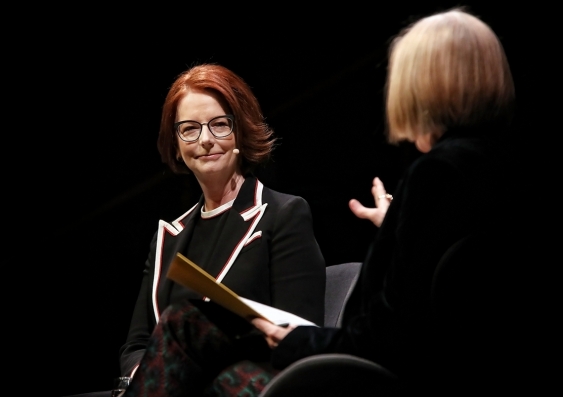Australia’s first female Prime Minister spoke at a sold-out event presented by UNSW Centre for Ideas in partnership with the Australian Human Rights Institute.

Former Prime Minister Julia Gillard chats with Jenny Brockie at Sydney’s Town Hall. Photo: Prudence Upton
Julia Gillard was sitting back in her chair, preparing to get off a flight from New York, when a flight attendant slipped her a note from a fellow passenger.
“Dear Julia,” the little note read.
“You’ve done more than your share of emotional labour for our country already, so I won’t interrupt you during what I am sure is some rare peace and quiet.
“I wanted to say thank you for being such a strong, intelligent, and unapologetic role model for myself and so many of my peers.”
Julia Gillard touched on the importance of role models when she spoke at Sydney’s Town Hall on Tuesday.

UNSW Professor Louise Chappell gave the opening address. Photo: Prudence Upton
The former Prime Minister discussed politics, resilience and learning through leadership at a sold-out event presented by UNSW Centre for Ideas in partnership with the Australian Human Rights Institute.
The event opened with an address by the Institute’s director and UNSW Scientia Professor, Louise Chappell, and was chaired by Walkley Award-winning journalist and the presenter of SBS’s Insight, Jenny Brockie.
Ms Gillard is the first woman to ever serve as Australia’s Prime Minister or Deputy Prime Minister.
Addressing an audience of 2000, she says it was the experience of university and student politics that made her realise she could have a career in government, but that it took some time to grow into her “emerging sense of self”.
“Role-modelling matters,” she said. “If you’ve never seen a woman do it then it’s much harder to imagine yourself in those shoes.
“For boys, there are a lot more choices.
“There is research that shows we are more likely to assess men on their potential and women on their track record”.
During her time as Prime Minister, she noted there were “undoubtedly periods” where she was treated far differently than male politicians.
“It’s clear from the psychological research that we tend to correlate likeability and leadership in men and not in women,” she explains.
“We tend to think of women leaders in terms of unlikeable, hardboiled and quite ruthless”.
She said when she was Prime Minister, nothing about her experience was explained by gender.
“It was often said: this is not about sexism, this is just about politics as usual,” she said.
“There is an acceptance now that there is sexism in politics, and we have to be alive to it and try to analyse it.
“I’ve identified as a feminist since my university days. I’ve always had an interest in women’s equality. My interest in women in leadership has probably been turbocharged by my own experience.”
After delivering her now famous 2012 misogyny speech, Ms Gillard said at first she didn’t feel a sense of catharsis, but a sense of frustration.
“I understand now how much it’s meant to so many women and I am very proud of that,” she said.
“I think we need more voices in the public square when something sexist happens to a woman leader, and I think it is important that a number of those voices are male ones.”

Louise Chappell (L), Jenny Brockie and Julia Gillard. Photo: Prudence Upton
On becoming a leader, Ms Gillard said it was very important for her to be clear about what she was governing for.
“I went to the extent of writing out on a sheet of paper the purpose of the government I led,” she said. “And, I used to carry that sheet of paper around with me to steady myself on the worst days.”
Ms Gillard passed on the following advice to young women: “Be conscious about your own sense of self and do not give it over to the capricious views of others”.
“You don’t have to be a public leader to see horrible things said about you. You can work yourself to a stage where you don’t end up hurt by those things said.
“Resilience is a muscle and if you work it, it gets stronger. I think I have given that muscle a fairly good work out.”
As for her plans on election night?
“I’ll be at home in Adelaide endlessly frustrating everyone else in the family by saying: Shhh Antony Green is speaking!”








